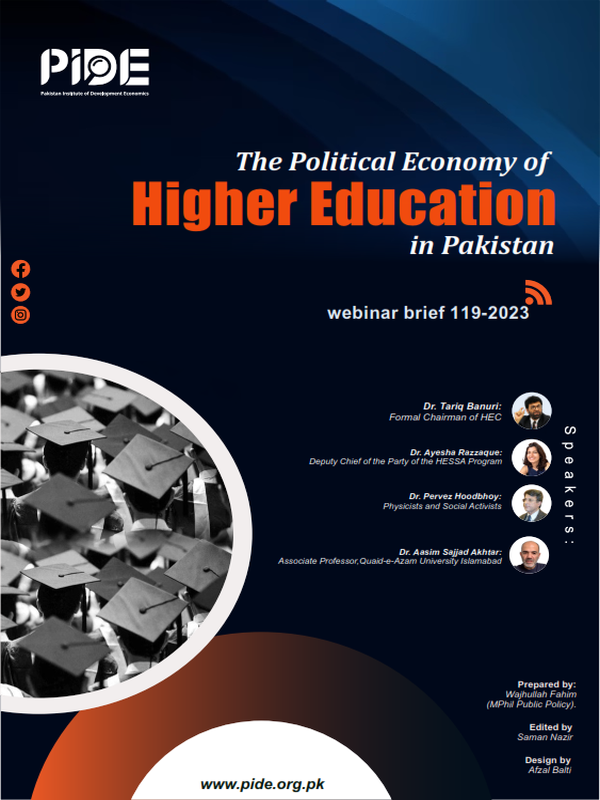The Political Economy of Higher Education in Pakistan
On 8th February 2013, the Pakistan Institute of Development Economics (PIDE) hosted a webinar, “The Political Economy of Higher Education in Pakistan. Mr. Abbas Moosvi, Research Fellow PIDE, moderated this webinar.
Speakers:
Dr. Ayesha Razzaque: Deputy Chief of the Party of the HESSA Program
Dr. Pervez Hoodbhoy: Physicists and Social Activists
Dr. Aasim Sajjad Akhtar: Associate Professor, Quaid-e-Azam University Islamabad
Dr. Tariq Banuri: Formal Chairman of HEC
Agendas of the Webinar:
During the webinar, the speakers focused following points;
- What are the main barriers that, after 75 years of independence, Pakistan cannot achieve a modern landscape in the field of Science& technology?
- Reasons for lack of quality higher education in Pakistan:
- Contribution of stakeholders in poor quality of Higher education in Pakistan :
- Main Issues and challenging faced by HEC:
Dr. Pervez Hoodbhoy addressed the first agenda point of the webinar. The current problems in Pakistan’s education system can only be solved by introducing administrative reforms once changing our current attitudes toward the educational sector. Our educational attitude is based upon receiving knowledge which is memorizing and re-producing in exams. In addition to this, it also introduced obedience education which is conceptualized as not allowing questions. Due to this attitude educational system of Pakistan has totally and absolutely collapsed. The fusion of religious extremism is also part of our attitude, contributing to the collusion of the educational system. Without changing the current attitude, the educational system of Pakistan cannot change.
Dr. Ayesha Razzaque highlighted the reasons for the lack of quality higher education in Pakistan. Lack of proper planning is the main reason for the poor quality of higher education. We talk about the needing for more skills, but we need to focus on skill development. In the federal budget, the developmental budget for Higher education was PRS 109 billion, while for vocational institutes budget was only PRS 3 million. We should give equal importance to both, and then people choose to pursue higher education or vocational education.
Dr. Aasim Sajjad responded to three agenda points of the webinar. All stakeholders HEC, university administration, faculty members, and students, are responsible for the current situation. HEC has had no vision for quality higher education since its creation. It has played a role in the quantification of quality, such as university faculties promoting the number of publications. HEC is playing only one role, which is selling a dream of the student. The university administration is focusing on increasing the number of students and sub-campuses, while faculty members focus on the number of publications. In this whole process, students are also responsible. The increase in demand for degree certification by students has contributed to the current situation. But as they have no power in the decision-making process, they are at least responsible.
Issues in HEC:
Dr. Tariq Banuri expressed issues and challenges he faced during his tenure as Chairman of HEC. The staffs of HEC have expertise in administration, but they need to gain expertise in academics. After 2002 HEC became a patronage source for the political system, development budget distribution, and VCs appointed based on the political affliction. Besides having a formula for budget allocation, HEC has no transparency and predictable policy in allocating the development budget. Policies owned by HEC are highly opaque. There need to be clarifications in HEC policies.
Recommendations:
- Transformation in our educational attitudes
- HEC should be an autonomous organization
- University professors should encourage critical thinking among students
- Ban on student unions should be uplifted.




